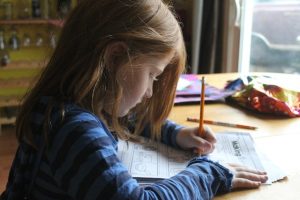Self-teaching can be a groundbreaking instructive choice for youngsters with extraordinary necessities, offering a customised approach that tends to their one-of-a-kind learning prerequisites. In this article, we investigate the advantages of self-teaching for youngsters with exceptional requirements and how it engages their singular development. But wait, are online schools accredited? Yes, one of the accredited school is Thomas Keith Independent School.
1. Customised Learning Plans:
Self-teaching permits guardians to configure customised learning plans that provide food explicitly to their youngster’s assets, difficulties, and interests. This individualised methodology guarantees that youngsters with unique necessities get the help and facilities important to succeed scholastically and inwardly.

2. Adaptability in Educating Techniques:
In a self-teaching climate, guardians can explore different avenues regarding different training strategies to find what turns out best for their kids. This adaptability empowers the utilisation of multisensory approaches, visual guides, and intuitive learning strategies that take special care of various learning styles.
3. Positive Learning Climate:
Youngsters with unique necessities could confront difficulties in conventional school settings, like tactile over-burden or trouble with changes. Self-teaching gives a quiet and steady climate, limiting possible stressors and encouraging an uplifting perspective towards learning.
4. Empowering Freedom:
Self-teaching engages youngsters with exceptional requirements to foster independence and self-backing abilities. Guardians can step by step present free, getting the hang of, and helping their youngster to oversee time, assets, and tasks with direction and support.
5. Tending to Socialisation:
Self-teaching doesn’t mean detaching youngsters with exceptional necessities from their friends. Guardians can effectively look for socialisation open doors through nearby care groups, local area exercises, and extracurricular projects customised to their kid’s advantage.
6. Integrating Fundamental abilities:
Self-teaching offers the adaptability to incorporate down-to-earth fundamental abilities as a component of the educational programme. These abilities, like cooking, overseeing funds, and critical thinking, are fundamental for a kid’s general turn of events and future Freedom.
7. Working together with Advisors and Subject matter experts:
Self-teaching guardians can work intimately with advisors, instructive analysts, and experts to integrate designated intercessions and treatments into their youngster’s learning plan.

8. Observing Advancement:
In a self-teaching climate, guardians have the chance to commend each achievement and progress accomplished by their youngsters. This encouraging feedback upgrades the youngster’s certainty and inspiration to develop.
Self-teaching for youngsters with unique requirements isn’t without challenges, yet with commitment, flexibility, and backing, guardians can establish a comprehensive and sustaining instructive climate that cultivates their kid’s singular development and achievement.
The Job of Play in Self-teaching for Small Children: Learning Through Fun
Small kids taking part in self-teaching have a fundamental impact on their instructive experience. In this article, we investigate the significance of play in self-teaching for small children and how it advances learning through tomfoolery and imagination.
1. Play as a Learning Device:
Play is a characteristic way for small kids to investigate their general surroundings and figure out their encounters. In a self-teaching climate, guardians can integrate play-based exercises into the educational plan to show ideas, foster coordinated movements, and upgrade social communication.
2. Invigorating Creative mind and Innovativeness:
Play supports creative mind and imagination, permitting youthful personalities to develop stories, make craftsmanship, and participate in pretend. These exercises add to the youngster’s mental and close-to-home turn of events.
3. Active Learning:
Play-put-together learning includes hands-with respect to encounters, which can make conceptual ideas more unmistakable and essential for small kids. Working with blocks, investigating nature, and leading basic science tests are drawing in ways of working with learning.
4. Social and Close to home Turn of events:
Through play, small kids master significant social and profound abilities like participation, compassion, and critical thinking. Play-based exercises with kin or companions give amazing open doors to Socialisation and collaboration.
5. Customised Growth opportunities:
Guardians can tweak play-based exercises to match their youngster’s advantages and learning styles. This personalisation guarantees that the youngster stays propelled and takes part in their instructive excursion.
6. Outside Investigation:
Self-teaching permits guardians to take advancing outside, giving kids chances to find nature, investigate the climate, and value the world’s variety.
7. Narrating and Education Advancement:
Narrating is a necessary piece of play and can improve a kid’s language and educational abilities. Guardians can energise narrating games, read-resoundingly meetings, and experimental writing activities to support their youngster’s affection for perusing and language.
8. Play-Based Appraisal:
Noticing a no problem can offer bits of knowledge into their inclinations, assets, and regions for improvement. Guardians can utilise play-based evaluation to as needs be illuminated their showing procedures and design the educational plan.
Integrating play into self-teaching for small children cultivates a blissful and improving growth opportunity, establishing the groundwork for a deep-rooted love of learning.

The Self-teaching Local Area: Building Associations and Backing
Self-teaching gives an open door to families to turn out to be essential for a dynamic and steady local area. In this article, we investigate the significance of the self-teaching local area, the advantages it offers, and how families can fabricate associations and track down help.
1. Sharing Information and Assets:
The self-teaching local area works with the sharing of instructive assets, illustration plans, and educational materials. This trade of data enables guardians to get to a different scope of materials that line up with their youngster’s advancing requirements and interests.
2. Systems administration and Socialisation:
Self-teaching families can associate through nearby care groups, centres, and get-togethers, furnishing youngsters with chances to cooperate with companions and fabricate fellowships.
3. Peer Backing for Guardians:
The self-teaching local area offers a stage for guardians to share encounters, look for counsel, and gain from each other. Associating with experienced, self-taught students can be particularly advantageous for those new to the excursion.
4. Field Outings and Instructive Exercises:
Self-teaching bunches frequently coordinate field trips and instructive excursions that supplement the educational programme. These encounters enhance the learning venture and furnish kids with active learning and open doors.
5. Extracurricular Projects:
Self-teaching networks might organise extracurricular projects like games, expressions, and language classes. Support in these exercises empowers youngsters to investigate their inclinations past scholarly subjects.
6. Support for Youngsters with Different Requirements:
Self-teaching networks embrace families with assorted foundations and requirements. Guardians of kids with unique requirements can track down help, understanding, and assets to improve their kid’s instructive experience.
7. Promotion and Legitimate Help:
The self-teaching local area can offer counsel and support on lawful issues connected with self-teaching. This help guarantees families stay consistent with guidelines and freedoms connected with home training.
8. Observing Achievements Together:
The self-teaching local area praises youngsters’ accomplishments and achievements, cultivating a feeling of having a place and support.
Building associations inside the self-teaching local area permits families to establish a sustaining and cooperative climate, enhancing their youngsters’ instructive excursion with an organisation of help and shared encounters.




